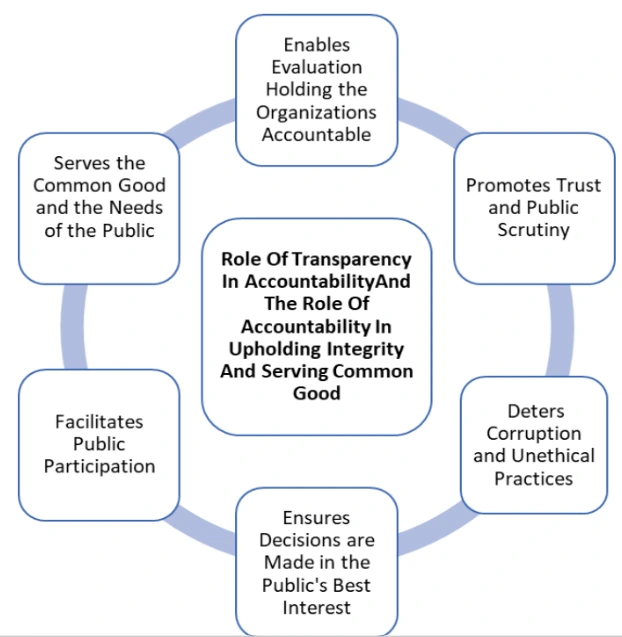Answer:
|
How to approach this question?
- Introduction
- Briefly write about ethical leadership.
- Body
- Justify the first statement of question.
- Write about the role of ethical leadership in the promotion of integrity.
- Write about the role of ethical leadership in the promotion of transparency.
- Write about the role of ethical leadership in the promotion of accountability.
- Conclusion
- Conclude on the positive note.
|
Introduction
Ethical leadership is the practice of leading with integrity, honesty, and a strong moral compass, inspiring others through fairness, transparency, and accountability as demonstrated by the former President of India, Dr. A.P.J. Abdul Kalam.
Body
Role of Ethical Leadership in Promotion of Integrity:
- Leading by Example: Ethical leaders like T. N. Seshan, former Chief Election Commissioner of India, inspire integrity by refusing compromises and implementing electoral reforms, setting a standard for ethical behaviour within the bureaucracy.
- Building a Culture of Trust: Ethical leaders create an environment where reporting misconduct is safe as exemplified by Sanjay Kumar Srivastava, former Chief Vigilance Officer of Indian Railways, who fostered a culture of trust through an anonymous reporting system.
- Recognizing and Rewarding Ethical Behaviour: Ethical leaders acknowledge and reward individuals who demonstrate integrity. Ms. Ritu Sharma, a senior officer in the Indian Revenue Service (IRS), exemplifies ethical leadership by fostering a culture that values and rewards integrity within her department.

- Promoting Open Communication: Ethical leaders foster a culture of honest and open information sharing.
Role of Ethical Leadership in Promotion of Transparency:
- Clear Information Policies: Ethical leaders establish transparent information guidelines.
- Example: Rajesh Kumar Sharma, an Indian bureaucrat, implemented clear information policies in a government organization, promoting transparency and accountability in the handling of sensitive information.
- Stakeholder Engagement: Ethical leaders involve stakeholders in decision-making.
- Example: Deepak Verma, a senior bureaucrat in the Ministry of Environment and Forests, demonstrates ethical leadership by engaging stakeholders through open discussions, involving them in decision-making for environmental policies.
- Transparent Performance Metrics: Ethical leaders use objective metrics for evaluation.
- Example: Rajesh Khanna, a senior bureaucrat in the Ministry of Power, demonstrates ethical leadership through transparently using objective metrics to achieve India’s 450 GW renewable energy target by 2030.
- Independent Audits: Ethical leaders conduct external evaluations for accountability.
- Example: Meera Desai, a respected bureaucrat in the Ministry of Finance, demonstrates ethical leadership by engaging external audit firms for independent audits, ensuring accountability and transparency in government agencies.
Role of Ethical Leadership in the Promotion of Accountability:
- Transparent Budget Allocation: Ethical leaders ensure open and accessible processes for allocating government funds, such as India’s GST system.
- Whistleblower Protection: Safeguards, like India’s Whistleblower Protection Act, protect those who report corruption or misconduct.
- Citizen Engagement: Ethical leaders involve citizens in policy-making, exemplified by India’s Right to Information Act promoting transparency and engagement.
- Anti-corruption Measures: like India’s Central Vigilance Commission, hold individuals accountable for corruption and promote a culture of integrity within government organizations.
- Performance-based Appraisals: Ethical leaders prioritize fair and accountable performance evaluations, as seen in India’s Performance Appraisal System for Civil Servants.
Conclusion:
In conclusion, ethical leadership, transparency, and accountability are vital for promoting integrity and serving the common good in government organizations. While challenges such as resistance to change and political interference exist, their successful implementation offers hope for a future where public trust is strengthened, corruption is minimized, and government actions align with the needs and aspirations of the people they serve.
To get PDF version, Please click on "Print PDF" button.


https://uploads.disquscdn.com/images/37759688459d8bb9d4eeb356c7c4285b64aedf88b47dd157ea87d32a3145374e.jpg https://uploads.disquscdn.com/images/310b441aef031256868d42112daafd98494fb388c1d4134e182789bb4c84eece.jpg
https://uploads.disquscdn.com/images/668ded2fb7d1fb240204aae8ae0c399b44dc11b2ce04252be29285183db1083b.jpg https://uploads.disquscdn.com/images/f428874cd8cd1840c7304407e5c5036e0c481b73007896ce7230495fe72a0995.jpg
https://uploads.disquscdn.com/images/e276325c35ca98944267a580bf8d5cc2cce3513e0985b0c1e57f58cf9c811233.jpg https://uploads.disquscdn.com/images/cbdc998377b03f302c41be928ea9f9689f4088b684e03726e9510af29ee082e9.jpg
https://uploads.disquscdn.com/images/2161759070796f864da5895d7e0b1455be45e35ca88b05d4791afd8025ebc4f7.jpg https://uploads.disquscdn.com/images/81275ae00d01166507207e519b3f8d9350ad6124fe1605ae583927059da83362.jpg